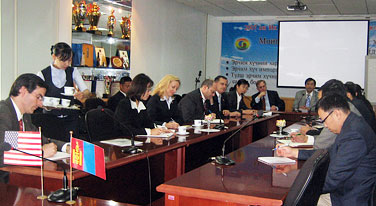|
|
|
||||||||
|
Short Takes: News from the International Trade Administration Mongolia Trade Mission Promotes Untapped Opportunities On September 15–19, 2008, Michelle O’Neill, deputy under secretary for international trade, participated in a certified trade mission to Ulaanbaatar, Mongolia, the first-ever to that emerging Asian market. The American delegation, led and organized by the North America–Mongolia Business Council (NAMBC) comprised 10 U.S. firms that represented a cross-section of U.S. industries with commercial interests in Mongolia.
“As Mongolia moves toward a free market economy, the country presents tremendous opportunities for U.S. investors and exporters in a number of sectors, including mining, medical equipment, pharmaceuticals, construction, high tech, equipment and machinery,” O’Neill said. Mongolia’s economy continues to grow rapidly at a rate of 10.2 percent gross domestic product in the first quarter of 2008. Mongolia’s vast territory offers a wealth of natural resources—most of them unexplored. The trade mission helped participating firms obtain market information, make business and government contacts, explore potential business prospects, and solidify business strategies. The trip also strengthened the trade and economic relationship between Mongolia and the United States. Highlights of the mission included business-to-business matchmaking appointments with local companies, as well as meetings with senior Mongolian government officials and local chambers of commerce. The U.S. delegation also participated in NAMBC’s 11th Annual Investors Conference and Prime Minister’s Roundtable. For more information on commercial opportunities in Mongolia, visit Export.gov.
Innovation and Growth of Small and Medium-Sized Enterprises Focus of Peru Gathering On August 27–29, 2008, Charles Skuba, chief of staff for the Market Access and Compliance unit of the International Trade Administration (ITA), led the U.S. delegation to the Asia-Pacific Economic Cooperation (APEC) Small and Medium Enterprise (SME) Ministerial Meeting in Chiclayo, Peru. The 26-member delegation included officials from ITA, the U.S. Small Business Administration, the U.S. Centers for Disease Control and Prevention, and the U.S. Department of Energy. Executives from the Computer Technology Industry Trade Association (CompTIA), the World Federation of Direct Selling Associations, and Sir Speedy Inc., also participated in the meetings. On August 27, 2008, ITA, CompTIA, and the Peruvian Ministry of Production hosted an APEC SME technology innovation seminar. Skuba opened the seminar, which attracted more than 200 participants, by highlighting how innovation is necessary for SME growth. “Innovation prospers in societies that value and nurture it,” Skuba said. “There must be a combination of important societal factors, including a strong education system that rewards independent thought, a culture that supports risk-taking, a marketplace that fosters openness (open competition and market-based technology standards), and a government that provides good protection for intellectual property rights and that sees businesses as long-term assets and not just opportunities for tax revenue.” ITA plans to host an APEC SME technology entrepreneurship seminar next June in Kuala Lumpur, Malaysia. Skuba represented the United States at the retreat and plenary sessions. Participants discussed the five key SME themes of sustainable environmental initiatives, corporate social responsibility, innovation management, public–private partnerships, and regional economic integration. Skuba also held bilateral consultations with senior government officials from Malaysia, Peru, Singapore, South Korea, and Taiwan. Ministers released a new four-year APEC SME strategic plan that highlights six priority areas: business environment, building management capability and promoting entrepreneurship, market access and internationalization, innovation, financing, and sustainable business practices. The plan frames the work in the APEC SME portfolio as the United States prepares to host APEC in 2011. For more information about the event, visit www.apec.org. President Bush Receives Final Report from Export Council On September 19, 2008, the President’s Export Council (PEC) presented its final report to President George W. Bush. The report, “The World Is Our Market: Strategies for American Prosperity,” chronicles the issues that have been addressed during the Bush administration, including two fact-finding trips, a corporate stewardship report, and numerous recommendations to the president. In June 2008, several PEC members accompanied Secretary of Commerce Carlos M. Gutierrez on a fact-finding trip to Russia and Ukraine. PEC members learned about the two economies and gave recommendations on how to improve the respective trade and economic relationships with the United States. PEC members met with senior Ukrainian and Russian government officials and private-sector representatives, as well as U.S. businesspeople and members of the American Chamber of Commerce. The PEC submitted 44 letters of recommendation to the president on issues that range from immigration and visa policy to Trade Promotion Authority, the World Trade Organization, and free trade agreements. One issue, however, stands out as a focus of the PEC’s efforts: immigration and visa policy. Although many of the council’s recommendations have been adopted or taken under advisement, PEC members believe that much more can be done in that area. Immigration and visa policy will be a major issue facing the next council. For more information about the PEC, visit www.trade.gov/td/pec.
Contributors to this section include Tu-Trang Phan of the International Trade Administration’s Office of the Deputy Under Secretary, Dan Miller of Market Access and Compliance, and Marc Chittum of Manufacturing and Services.
|
|
